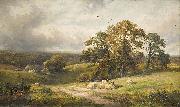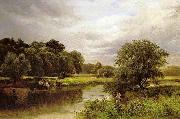|
||||||||||
|
|
||||||||||
|
A quiet scene in Derbyshire ID de tableau:: 75695 Voir la galerie dans Suède |
A quiet scene in Derbyshire English: A quiet scene in Derbyshire (oil painting) by George Turner Date 1885 cyf English:_A_quiet_scene_in_Derbyshire_(oil_painting)_by_George_Turner_ Date_1885 _ cyf |
|||||||||
|
|
||||||||||
|
Fishing on the Trent ID de tableau:: 75696 Voir la galerie dans Suède |
Fishing on the Trent English: Fishing on the Trent (oil painting) by George Turner Date 1875 cyf English:_Fishing_on_the_Trent_(oil_painting)_by_George_Turner_ Date_1875 _ cyf |
|||||||||
|
|
||||||||||
|
1 | Artiste précédent Artiste prochain | |||||||||
|
|
||||||||||
| George Turner | ||||||||||
| 1750-1843. Turner was born in Cromford, Derbyshire in England, but then moved to Derby with his family. He showed an early talent for music and art - encouraged by his father Thomas Turner, who although a tailor by profession was also an art enthusiast. Turner was largely self-taught and went on to become a professional painter and art teacher. A quiet scene in Derbyshire (1885)Turner lived in Derbyshire all his life. In 1865 he married Eliza Lakin (1837 - 1900), becoming a part-time farmer and raising four children at Walnut farm in Barrow upon Trent.[1] After Eliza's death in 1900, he moved to Kirk Ireton and later married fellow artist Kate Stevens Smith (1871-1964) - they set up home in Idridgehay where he died in 1910. His son William Lakin Turner (1867-1929) also became a landscape oil painter of repute. Turner worked in oils and painted bucolic scenes mainly of his native Derbyshire, leaving an important legacy of hundreds of pictures depicting the English countryside before the coming of mechanisation, the motor car and urban expansion. His work was exhibited in Nottingham and Birmingham. Turner served on the Art Committee of Derby Art Gallery and both his and his son's paintings are included in the city's collection. | ||||||||||
|
|
||||||||||
IntoFineArt Co,.Ltd.











